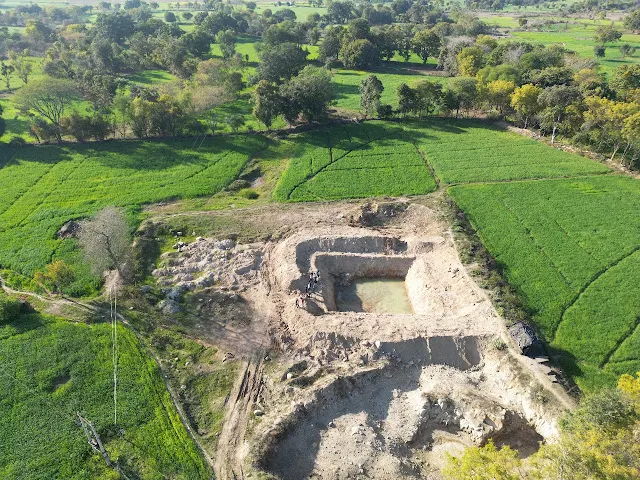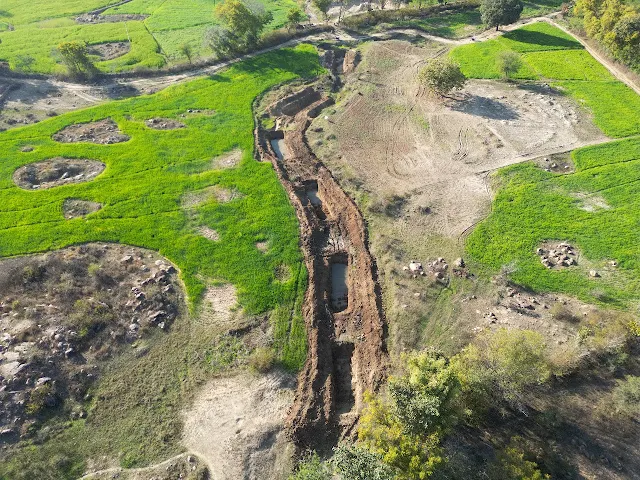Madhya Pradesh villages show extent to which water conservation can improve life within a relatively short time
Till just about five years ago, in Nadna village of Shivpuri district (Madhya Pradesh) in Central India, the situation for most households was quite distressing. As several women of this village related recently in a group discussion, most of the rainwater rapidly flowed away from the village quite rapidly on sloped land, leaving hardly anything for the longer dry season ahead and contributing very little to water recharge. What is more, on the sloped land the rapid water torrents carried away a lot of the fertile topsoil as well.
With all the rainwater being lost quickly and even carrying away fertile soil, the farm productivity in the village was very low, and in fact very little could be grown in the rabi season devoid of monsoon rains. Some of the land even remained uncultivated. In this village located in Pichore block, water scarcity remained a constraint not just for farming but also for animal husbandry. Not just villagers and their animals, but wild life also suffered due to water scarcity.
Due to low development prospects in farm and animal husbandry based livelihoods, people of this village, particularly those from poorer households, were becoming heavily dependent on migrant labor. The work which most of the migrants from here could get was frequently exploitative and also uncertain, but due to lack of alternatives, villagers had to resort to this as a survival mechanism despite all the distress and difficulties they suffered.
However about four years back a number of water conservation steps were initiated in this village. These included the creation of bunds and digging of small ponds in fields and construction of a gavian structure to keep a good part of rainwater in the village. In the two nullahs which drain the rainwater, about 80 spots were selected in consultation with the local villagers for digging measured ditches called dohas which can help to keep rainwater for a much longer period for use by farmers and animals. All this helps to conserve rainwater at many places but in addition also increase the overall water level in the village and its wells so that it becomes possible to get more water more easily from wells and hand-pumps. Now farm animals as well as wild animals can find more water to drink even in dry months. Moisture conservation has resulted in the sprouting of more grass and related greenery, resulting in better grazing for animals.
At the same time, farm productivity has gone up. Now there is more cultivation of rabi crops like wheat and in addition some of the land left more or less uncultivated earlier has also been brought under cultivation now. With soil erosion being checked too, soil quality is getting better. Villagers have added further to this gain by gradually moving in the direction of natural farming, improving soil quality while also reducing their expenses. More efforts are being made to produce organic fertilizers locally on their farms in self-reliant ways.
As a result of all this the dependence of villagers on exploitative migrant labor has reduced considerably.
The situation in Umrikhurd village has also changed in a somewhat similar way, thanks to the digging of farm ponds and dohas as well as the creation of bunds in farms. An additional livelihood of pond fisheries has also emerged. As women related happily in a recent group discussion, now you can find water at several places where earlier it used to be dry by now. This has also been very helpful for them to take up new initiatives like orchards which would have been very difficult earlier. Hence one sees a situation of emerging new hope in this village.
Another important aspect of recent changes in these two villages has been that significant gains here have been made from the point of view of climate change mitigation as well as adaptation.
Several other villages in Shivpuri district have seen the kind of water conservation initiatives seen in these two villages. These initiatives in the two villages were taken up by SRIJAN voluntary organization with support from Axis Bank Foundation and IndusInd Bank.
---
*The writer is Honorary Convener, Campaign to Save Earth Now. His recent books include Man over Machine, Protecting Earth for Children, and A Day in 2071



Comments